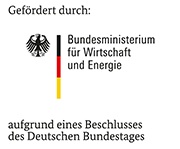252 ZBG

Hochtemperaturofen in Betrieb
| Period: | 2007-04-01 to 2009-03-31 |
|---|---|
| Funder: | Federal Ministry for Economics and Technology (BMWI, Germany) via AiF |
| Project Manager: | Dr. Alexander Donchev |
| Research Group: | High Temperature Materials |
Titanium alloys are widely used in different fields. The density of Ti is about 4.5 mg/cm3 and thus much lower than steels. The melting point of Ti is 1660°C. At room temperature or lower temperatures the titanium oxide TiO2 can protect the metallic compound due to low oxidation kinetics. At higher temperatures (>600°C) the oxygen diffusion becomes the rate determining step because the crystal structure of TiO2 has a lot of defects. More disadvantages are the susceptibility against titanium fire and the oxygen uptake which leads to embrittlement because up to 25 wt.% O2 can be dissolved in α-Ti.
To overcome these problems the surface of Ti compounds has to be modified. Al enrichment on the surface by coatings has been tried already but this attempt was only slightly beneficial. The combined Al enrichment plus additional fluorine treatment proved to be much more beneficial. The fluorine effect known from TiAl alloys would be transferred to Ti alloys too. The formation of an Al2O3 scale is promoted by the fluorine and this layer is protective against environmental attack even under thermocyclic conditions and prevents the oxygen diffusion into the substrate. The parameters for the Al-enrichment have to be optimised first and afterwards such treated samples will be fluorine implanted at the Research Centre Dresden (FZD) by the plasma-immersion-ion-implantation (PI3). The PI3 technique allows the implantation of complex geometries and is cheaper than the conventional beamline implantation. The Al enrichment will be done at the KWI. The investigations of the corrosion and mechanical properties of the untreated and treated alloys will be observed at the KWI too. This project is cooperation between the KWI and the institute of ion beam physics and materials research of the FZD.
back
Das IGF-Vorhaben Nr. 252 ZBG der Forschungsvereinigung DECHEMA e.V., Theodor-Heuss-Allee 25, 60486 Frankfurt am Main wurde über die AiF im Rahmen des Programms zur Förderung der industriellen Gemeinschaftsforschung (IGF) vom Bundesministerium für Wirtschaft und Energie aufgrund eines Beschlusses des Deutschen Bundestages gefördert.
Dr. Alexander Donchev
Tel.: +49 69 / 7564-386
E-mail: alexander.donchev
Final Report (pdf, 6.2 MB, in German)